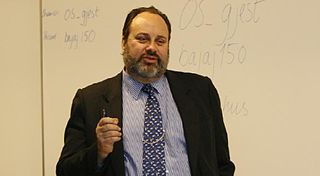Related Research Articles

Stanford Law School (SLS) is the law school of Stanford University,a private research university near Palo Alto,California. Established in 1893,Stanford Law had an acceptance rate of 6.28% in 2021,the second-lowest of any law school in the country. Since 2019,Jennifer Martínez has served as its dean.

The University of Chicago Law School is the law school of the University of Chicago,a private research university in Chicago,Illinois. It employs more than 180 full-time and part-time faculty and hosts more than 600 students in its Juris Doctor program,while also offering the Master of Laws,Master of Studies in Law and Doctor of Juridical Science degrees in law. The law school has the third highest percentage of recent graduates clerking for federal judges after Stanford Law School and Yale Law School.

Yale Law School (YLS) is the law school of Yale University,a private research university in New Haven,Connecticut. It was established in 1824 and is one of the most selective academic institutions in the world. The 2020–21 acceptance rate was 4%,the lowest of any law school in the United States. Its yield rate of 87% is also consistently the highest of any law school in the United States.
A Doctor of Juridical Science,or a Doctor of the Science of Law, is a research doctorate in law equivalent to the more commonly awarded Doctor of Philosophy degree.
Jonathan R. Macey is an American legal scholar who serves as the Sam Harris Professor of Corporate Law,Corporate Finance and Securities Law at Yale Law School.

David E. Bloom is an American author,professor,economist,and demographer. He is a Professor of Economics and Demography at the Harvard School of Public Health,and director of the Program on the Global Demography of Aging. He is widely considered as one of the greatest multidisciplinary social science researchers of the world.

Robert Georges Picard is an American writer and scholar in the field of media businesses and media policy economics. He heavily influenced media economics studies.
Robert I. Weisberg is an American lawyer. He is an Edwin E. Huddleson,Jr. Professor of Law at Stanford Law School,and an expert on criminal law and criminal procedure,as well as a leading scholar in the law and literature movement.
Vikramaditya Khanna is a professor of law at the University of Michigan Law School,and the founding and current editor of the India Law Abstracts and the White Collar Crime Abstracts on the Social Science Research Network.

Deborah Lynn Rhode was an American jurist. She was the Ernest W. McFarland Professor of Law at Stanford Law School and the nation's most frequently cited scholar in legal ethics. From her early days at Yale Law School,her work revolved around questions of injustice in the practice of law and the challenges of identifying and redressing it. Rhode founded and led several research centers at Stanford devoted to these issues,including its Center on the Legal Profession,Center on Ethics and Program in Law and Social Entrepreneurship;she also led the Michelle R. Clayman Institute for Gender Research at Stanford. She coined the term "The 'No-Problem' Problem".

Michael Robert Auslin is an American writer,policy analyst,historian,and scholar of Asia. He is currently the Payson J. Treat Distinguished Research Fellow in Contemporary Asia at the Hoover Institution,Stanford University,a Senior Fellow in the Asia and National Security Programs at the Foreign Policy Research Institute,and a senior fellow at London's Policy Exchange. He was formerly an associate professor at Yale University and a resident scholar and director of Japanese studies at the American Enterprise Institute,a conservative think tank in Washington,D.C.
C. Scott Hemphill is a legal academic whose scholarship focuses on intellectual property law and antitrust law. He is currently a Professor of Law at New York University Law School,where he has taught since 2015. Previously,Hemphill was a Professor of Law at Columbia Law School.
Bernadette Meyler is the Carl and Sheila Spaeth Professor of Law at Stanford Law School,where she has taught since 2013. Meyler's scholarship focuses on British and American constitutional law,the history of the common law,and the intersection of law and the humanities.
Stuart Alan Banner is an American legal historian and the Norman Abrams Professor of Law at the UCLA School of Law. Banner also directs UCLA's Supreme Court Clinic,which offers students the opportunity to work on real cases before the U.S. Supreme Court.
Gillian Kereldena Hadfield is a professor of law and of strategic management who is the inaugural Schwartz Reisman Chair in Technology and Society at the University of Toronto Faculty of Law. She is also director of the Schwartz Reisman Institute for Technology and Society. Previously,she was the Richard L. and Antoinette Schamoi Kirtland Professor of Law and Professor of Economics at the University of Southern California. At USC,Hadfield directed the Southern California Innovation Project and the USC Center in Law,Economics,and Organization. She is a former member of the board of directors for the American Law and Economics Association and the International Society for New Institutional Economics.
Thomas C. Grey is the Nelson Bowman Sweitzer and Marie B. Sweitzer Professor of Law,Emeritus,at Stanford Law School. As a legal theorist and a historian of modern American legal thought,Grey has written widely on pragmatism,legal formalism,legal realism,and the jurisprudence of Oliver Wendell Holmes Jr.

Robert Harris Mnookin is an American lawyer,author,and the Samuel Williston Professor of Law at Harvard Law School. He focuses largely on dispute resolution,negotiation,and arbitration and was one of the primary co-arbitrators that resolved a 7-year software rights dispute between IBM and Fujitsu in the 1980s. Mnookin has been the Chair of the Program on Negotiation at Harvard Law School since 1994.
Andrew Metrick is an American economist who is the current Janet L. Yellen Professor of Finance and Management at the Yale School of Management. His research has touched on topics including game theory,venture capital and private equity,and most recently on financial stability. He is also the director of the Yale Program on Financial Stability.

The Michigan State Law Review is a law review published by students at Michigan State University College of Law. It is the flagship journal of the school and it publishes five issues per year. According to the Washington &Lee Law Journal Ranking,Michigan State Law Review was the 48th highest-ranked flagship legal journal in 2022,a dramatic increase from its ranking of 332rd in 2003. The journal hosts an annual academic conference of global legal experts with past events covering issues such as autonomous vehicles,quantitative legal analysis,civil rights,and intellectual property. Professor David Blankfein-Tabachnick has served as Faculty Advisor of the journal since his appointment in 2016. In 2018,the journal began publishing an annual "Visionary Article Series," which features the work of one prominent legal scholar per year.
References
- 1 2 3 "Biography". law.stanford.edu. Stanford Law School. Retrieved July 18, 2015.
- 1 2 3 4 5 6 7 "CV" (PDF). law.stanford.edu. Stanford Law School. Retrieved July 18, 2015.
- ↑ "Recent Publications". law.stanford.edu. Stanford Law School. Retrieved July 18, 2015.
- ↑ Leiter, Brian (June 11, 2014). "Top Ten Faculty (by Area) in Scholarly Impact, 2009-2013". leiterrankings.com. Retrieved July 18, 2015.